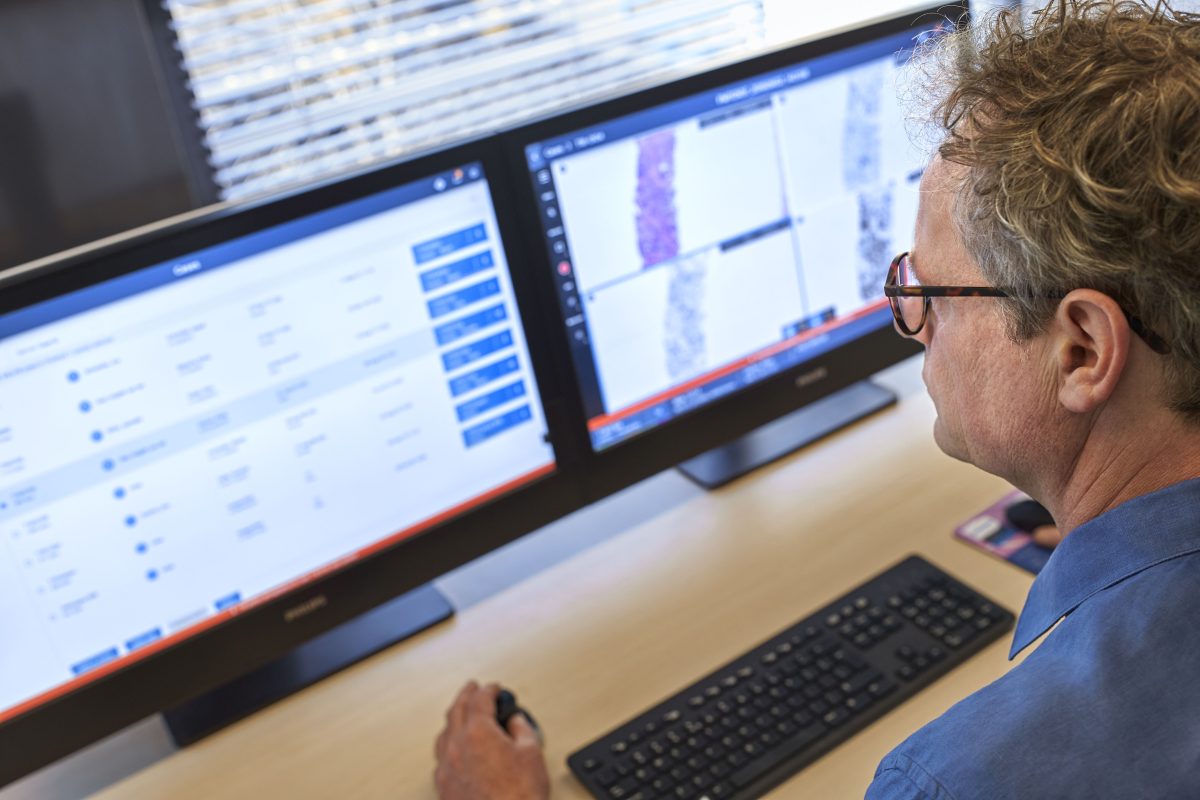Royal Philips (NYSE: PHG, AEX: PHIA), a global leader in health technology, today announced the launch of its next-generation digital pathology solution, moving digital pathology into the heart of enterprise-wide healthcare informatics.
Philips Digital Pathology Suite – IntelliSite – features a comprehensive, scalable suite of software tools and capabilities designed to help streamline workflows, enhance diagnostic confidence, facilitate team collaboration, integrate artificial intelligence (AI) and increase the efficiency of pathology labs.
Philips Digital Pathology Suite offers a range of solutions designed for different use cases with an affordable cost of ownership. From low-volume ‘spoke’ labs or small independent labs, where small batches of slides are continually processed and scanned, to medium and large labs operating high-volume batch processing workflows. The hardware is also pre-equipped for multi-layer slide scanning. Images are captured in a centralized informatics platform that has been optimized around pathologists’ workflows, integrating with leading third-party AI tools and algorithms with the aim to further reduce laboratory costs and enhance diagnostic capabilities.
“Integrated diagnostic capabilities are a cornerstone to a precise diagnosis and personalized care pathway selection for oncology patients and only when data and specialties work together in harmony can the ultimate promise of care be realized,” said Louis Culot, General Manager Oncology Informatics at Philips. “That’s why bringing together multiple pieces of the healthcare continuum – like radiology, pathology, and genomics – is the key to a new paradigm of diagnostic precision. By providing pathologists the interoperability and connectivity to share high-quality images and diagnostic insights across networks, Philips Digital Pathology Suite positions them as key stakeholders in the data-driven healthcare systems of the future.”
Digital Pathology Suite includes a range of three pathology slide scanners, as well as Pathology Workspace – Image Management System – a comprehensive set of software tools and capabilities that encompass every stage of the digital pathology process, including an advanced image management system, bidirectional interoperability into laboratory information systems, and a case viewer that facilitates multidisciplinary case reviews and care pathway selection. Diagnostic confidence is enhanced by superb image quality and advanced algorithms, such as automatic tissue shape detection and non-rectangular optimization of regions of interest. Vendor-agnostic data interoperability also allows the easy sharing of patient-centric histology data across enterprises and between sites.
“MEDIPATH is focused on accelerating the path of augmented pathology by slide digitalization on all our technical platforms. We are very excited to leverage the new Philips Digital Pathology Suite, including the Pathology Scanner SG300 and Pathology Workspace with de-identification tools, for each of our sites,” said Stephane Rossat, Director for innovation, science and project management at MEDIPATH, a French Pathology group with a network of 11 technical labs. “Following the first days of installation, the solution is already proving easy to use, with images generated more quickly, while the quality and sharpness of the images produced is experienced to be superior. The Philips Digital Pathology Suite is the solution that our organization needs to expand our digital pathology capabilities and activate our transformation [1].”
Integrated intelligence and automation across smart diagnostic systems
Precision medicine has increased the volume and complexity of workloads, with pathology labs worldwide facing a shortage of skilled staff. Within the diagnosis and staging of cancer, pathology information is combined with data from multiple disciplines, including radiology, pathology and genomics, to deliver the diagnostic precision required for highly personalized care. There is an urgent need for solutions that combine operational efficiency, team-working, expertise sharing, and enterprise-wide informatics to make the most of a pathology lab’s human resources.
Through breakthrough innovations and partnerships, Philips integrates intelligence and automation into its Precision Diagnosis portfolio, including smart diagnostic systems, integrated workflow solutions with the aim to transform departmental operations, advanced informatics that enhance diagnostic confidence, and care pathway solutions that allow medical professionals to tailor treatment to individual patients. By developing and integrating AI-enabled applications, the company aims to enhance the ability to turn data into actionable insights and drive the right care in the right sequence at the right time.
Philips Digital Pathology Suite is being showcased at the Pathology Visions 2021 event (October 17-19, Las Vegas, USA). Follow @PhilipsLiveFrom for updates on Philips participation at the event, and visit Philips Digital Pathology for more information.



